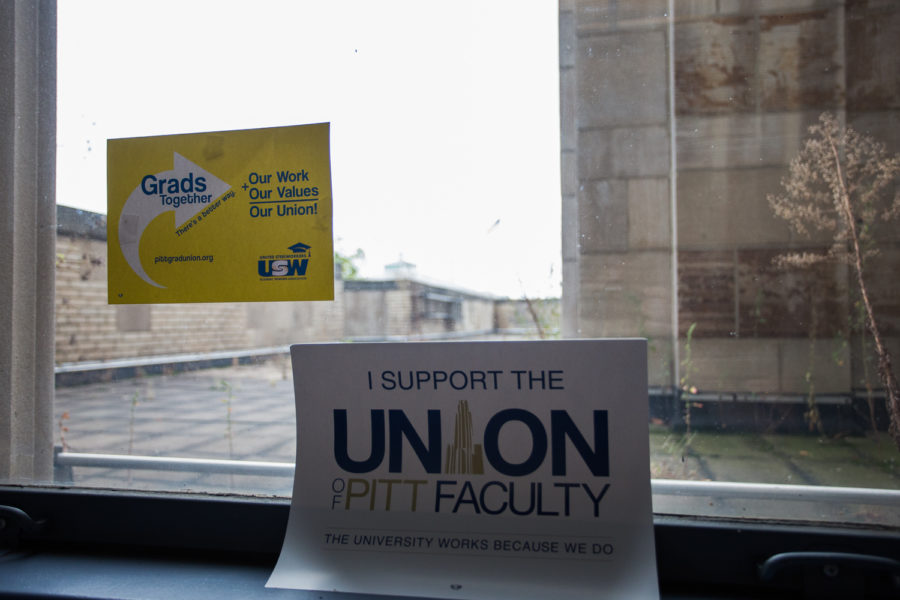Opinion | Students should pay attention to Pitt unionization efforts
September 28, 2021
Across the City, “Vote union yes!” signs sit in business windows and yards. For many Pitt students, this is the most interaction they’ve had with the faculty’s campaign to unionize.
It is an effort that is years in the making and will come to a head in mid-October.
The Pennsylvania Labor Relations Board, which oversees public sector union elections, mailed ballots to roughly 3,000 eligible faculty in late August. Faculty have the option to vote for or against unionization.
Ballots are due in Harrisburg by Oct. 12 and union organizers recommend that faculty send them in by Oct. 5. If the vote passes, the faculty union will be affiliated with United Steelworkers, which has aided faculty in its campaign since 2016.
So why should students care about the efforts to unionize? For Tyler Bickford, an associate English professor, the answer is simple.
“Faculty working conditions are student learning conditions,” Bickford said. “When faculty have less resources, when classes are larger, when faculty are underpaid and have to take on other jobs, they do not have the ability to support students the way that they can and should be able.”
Unionization would give Pitt faculty the ability to collectively bargain and advocate for improving pay, health policies, job security, workload and transparency from administrators — issues that have become glaring in the face of the COVID-19 pandemic. In order to make these negotiations, union members would elect a bargaining committee to represent different groups of faculty.
This would be all done under the umbrella of United Steelworkers. The USW has a long history of supporting workers in western Pennsylvania, and represents workers in a diverse array of fields. Their role is to provide technical support and resources, but according to union organizer Robin Sowards, all of the decisions and demands would be entirely faculty-driven.
“The faculty will set their own priorities, will formulate their own proposals, will try to find common ground with the administration and will ultimately vote on whether or not to accept the resulting agreement,” Sowards said.
The impending election has generated discourse within the community. The undergraduate Student Government Board decided not to join with other elected student leaders on campus in signing a statement supporting faculty unionization.
A significant argument from faculty opposed to unionization is that Pitt already has a strong system of shared governance, meaning faculty have a say in University affairs. Administrators have gone as far to say that there’s no real need for a union.
But an administration that is supportive of its faculty doesn’t spend over $2 million on legal advice from Ballard Spahr, a “union avoidance” law firm.
There are other points of conflict as well. When organizers filed for a union election in 2019, the state labor board ruled that they had not collected authorization cards from the required 30% of eligible faculty. The board later found that the list of 4,018 eligible faculty Pitt had provided was “factually and legally inaccurate” and removed nearly 400 names, many of whom were upper administrators or faculty who left the University years earlier.
Why go to all that trouble? The administration could be worried that a union would empower faculty and radically alter the relationship between the two. What the administration is offering are the illusions of choice and democracy — just look at some of the biggest decisions made this year.
Pitt’s lackluster COVID-19 response is a prime example of why the faculty need a union. Despite both the Faculty Assembly and Senate Council voting in favor of a vaccine mandate, Pitt announced this summer that it would not be mandating a vaccine, instead opting for mandatory weekly testing for the unvaccinated and a raffle incentive.
The burden of this pandemic rests on professors. In the beginning, they were expected to comprehensively adapt their curriculum into an online format. Now, they are facing unclear communication from the administration about the ability to offer online options and are responsible for enforcing the mask mandate.
Faculty deserve the ability to collectively bargain and organize during a public health crisis, especially after the elimination of the Flex@Pitt teaching model, which has made it significantly harder for professors to keep themselves and their families safe.
But there is also a greater notion about the future we wish to see here at Pitt. The movements to unionize faculty, graduate students and now staff reflect a desire to have a more equitable and sustainable work environment.
Higher education is at a crossroads. Will universities be accessible for those who learn and work there? Will looming structural problems, such as the decline of the tenure system and state funding, be addressed? Will our professors be better equipped to advocate for their needs?
Students — if you’ve worried about being out for two weeks following a positive COVID-19 test or sitting in an overpacked classroom this semester, then you should be paying attention. All over campus, young people have been volunteering with organizers and sharing petitions. To join in this effort, you can contact [email protected].
India is The Pitt News’ informed rebel girl. Write to her at [email protected] or follow her on Twitter @indialarson_, but you better like her tweets.




